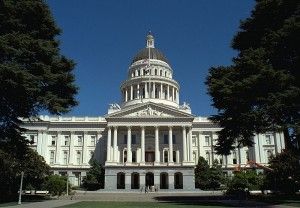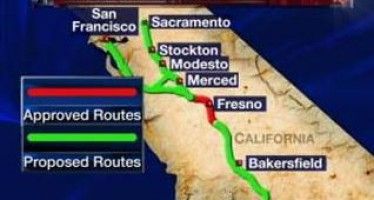Bad Bill Mill, Part Deux
APRIL 21, 2011
By KATY GRIMES
With 79 full-time Assembly members and 40 Senators pumping out more than 2,000 bills each year, the bad bills just keep coming. And as with any group of 120 different persons, there will be some exceptional product produced, some mediocre work and some real drivel.
Tuesday I wrote about several loathsome state Senate bills. Today we are looking into the Assembly. Some of the bills might be considered funny, if not just plain ridiculous, but the humor is gone from the economy and the joke is on us.
Whether legislators are trying to prevent people from distributing flyers near public schools or requiring water meters to be installed in all buildings — except low income housing, student housing and government housing — lawmakers are covering the gamut of bad taste and special interests. They are demonstrating just how insensitive and deaf they are to the plight of the responsible working class of taxpayers in the state. And they are proving that the need for a full-time legislature is debatable if this is the level of work being produced.
Here are the worst of the worst bills:
AB 19 by Assemblyman Paul Fong (D-Mountain View): This bill requires newly constructed commercial structures, apartments, multi-plexes and condos to install water meters for each unit, ostensibly “so consumers will be able to save water and money by monitoring their water usage,” according to Assembly Democrats. Sponsored by Sierra Club California, and “in response to California’s drought,” AB 19 would require the owner of the structure to ensure that the water meters comply with all laws and regulations surrounding installation, meter type, maintenance, reading, billing and testing.
However, the bill would exempt certain buildings from these requirements: low-income housing, student dormitories, long-term health care facilities and time-share properties — the last a special-interest exemption.
Two previous attempts at water metering failed — AB 1975 (Fong) and AB 1173 (Keene) — because of concerns regarding impacts to low-income tenants. So this time, low-income housing was just exempted. Apparently students and those with lower incomes are exempted from the drought, but those of us who pay the bills are not.
AB 325 by Assemblywoman Bonnie Lowenthal (D-Long Beach): This bill would require employers to allow employees to take four days off for bereavement leave. It is titled, “Employee’s right to bereavement leave.” Existing law already provides employees with the right to take time off work “without discharge or discrimination for a number of reasons.”
Sponsored by the California Employment Lawyers Association (CELA), AB 325 prohibits an employer from discharging, disciplining or discriminating against an employee for inquiring about, requesting or taking up to four days’ bereavement leave upon the death of a spouse, child, parent, sibling, grandparent, grandchild or domestic partner.
The bill states that the bereavement leave is to be unpaid, but allows the employee to use vacation, personal leave; and the three days of bereavement leave do not need to be consecutive.
Under existing the law, several types of leave are already mandatory. And most employers are already flexible when leave is needed, and should not be faced with the threat of a lawsuit should they deny permission for time off due to work production. Some employers even pay for bereavement leave.
The bereavement leave does not have to be taken immediately upon the death of the family member, and can be used within 13 months, allowing the employee to use it at their convenience, or even tack it onto a vacation.
Should an employee feel discriminated against by the employer for asking for the leave, the bill grants employees the right to recover actual damages through the Division of Labor Standards Enforcement, or sue in civil court.
The employment lawyers state that because “everyone suffers the devastating loss of a relative at some point during their life, without legislation providing the right to bereavement leave, an employer may legally discharge an employee for requesting or taking any leave of absence to prepare or attend the funeral of a loved one.”
This bill is just one example of how many legislators are unfamiliar with how the private sector operates, where in many cases there are not multiple employees to fill in for one absent worker. Small business owners argue that they cannot always accommodate time off, and do not have the resources to fill in for an employee gone from work. And because employers are already required to allow employees to take time off for so many reasons, including many different personal leaves, this is just one more costly hit on the employer by a Legislature unfriendly to business.
AB 312 by Assemblywoman Bonnie Lowenthal (D-Long Beach): This bill would allow homeless persons the right to invoke hate-crimes protection, and sue an assailant in civil court. The bill states that the homeless should be free from hate-based violence or intimidation by threat of violence just because they are homeless. It adds “homeless” to the existing law of protected statuses.
The Ralph Civil Rights Act provides that all persons within the state have the right to be free from any violence, or intimidation by threat of violence, committed against their persons or property because of personal or other characteristics or statuses, such as political affiliation, sex, race, color, religion, marital status, sexual orientation or position in a labor dispute.
And now Lowenthal wants to add homelessness to the list of protected categories.
The bill defines a homeless person as “a person who does not have a fixed, regular, and adequate nighttime residence,” or “has a nighttime residence that constitutes a supervised, publicly or privately operated shelter designated to provide temporary living accommodations, including, but not limited to, welfare hotels, congregate shelters, and transitional housing.”
Interestingly, many homeless persons receive welfare and Social Security benefits. According to the Social Security Administration, “You do not need to have a home to get SSI or SSDI, only a way for SSA to contact you and pay your benefits (by mail or direct deposit). You can get SSI for 6 months out of every 9 months you stay in a public (government run) emergency shelter. There is no time limit on getting SSI in a private shelter. There are no limits on getting SSDI in a shelter.”
The bill would also require owners of residential rental or commercial properties to protect a homeless person (who is present on the property) from violence or intimidation by threats of violence.
Lowenthal’s bill rests largely on homelessness studies, including one from the National Coalition for the Homeless titled, “America’s Growing Tide of Violence, August 2010.” The NCH advocates on behalf of the homeless through federally financed programs including the Department of Housing and Urban Development. The NCH employs as national field staff and hordes of AmeriCorps workers. The NCH also advocates that the federal government provide “every American an annual income — whether through wages, public income assistance, tax credits, or a combination thereof — sufficient to obtain and maintain permanent housing that costs no more than 30 percent of the household’s income.”
It is difficult not to ask Lowenthal if it is less of a crime to assault a person who has a home than it is to assault a homeless person?
Many believe that there is a bigger problem in the state: the crimes being committed daily by the homeless, including vandalism, public defecation and urination, theft, trespassing, sexual assault, robbery and aggressive panhandling. The Sacramento police that I’ve spoken with say that most crimes against the homeless are by other homeless persons.
AB 324 by Assemblywoman Joan Buchanan (D-San Ramon): It requires the Department of General Services to actually take into consideration where its employees live when selecting a location to lease, purchase or construct.
Sponsored by the city of Elk Grove, this bill requires consideration of the location of the community or population served by the state building, the location of the workforce and the priority given to the locations that demonstrate the highest reduction of miles traveled by the workforce.
This is not a joke. AB 324 also requires consideration of the availability and proximity of high-quality, frequent transit service.
According to Buchanan’s office:
The DGS currently does not consider the residential locations of the majority of their workforce when planning for the construction or acquisition of new state buildings. As a result, communities with the highest concentration of state workers often have to travel further distances to get to work. California’s shortage of public transportation systems amplified this problem, particularly in the rural areas of our state. This bill would allow the DGS to consider where the workforce lives when planning the lease, purchase or construction of a state building.
According to the City of Elk Grove, of the 140,000 city residents:
12,625 are state workers. 77 percent of those workers, nearly 10,000 cars, drive to work alone, while the remaining 12.7 percent of Elk Grove state workers carpool. The resulting impact of these motorists is an average annual commute of 7,195 miles per vehicle, totaling 90,836,875 miles for the entire population.
If Elk Grove officials wants state agencies to locate within the city’s boundaries, they need to lobby the state instead of creating a special interest bill, which could impact the rest of the state. And Elk Grove is hardly rural, located within Sacramento County.
AB 1174 by Assemblyman Warren Furutani (D-Long Beach). It states that any person who disturbs a public school activity, including the arrival and departure of students at school during school hours, is guilty of a misdemeanor and subject to a fine of $500. Because this bill would expand the scope of an “existing crime,” it would impose a state-mandated local program.
What crime is Furutani talking about? Under a loose definition of what constitutes disturbing public school activity, parents, students, teachers, school employees and the general public, on public sidewalks near the school, could be arrested for picketing, passing out flyers or talking to students, teachers or administrators.
Parents distributing information about after-school sports, clubs or scouting could be charged with the “crime” of disturbing public school activity if school officials don’t care for the topic being solicited. Even the ACLU opposes the bill because “on its face appear to criminalize protected First Amendment activities.”
In the bill analysis, the author cites the following examples of inappropriate interactions:
In 2002, members of Survivors of the Abortion Holocaust gathered outside Millikan High School in Long Beach. The group, located on the sidewalk directly bordering the high school, displayed gruesome signs and distributed leaflets to students during dismissal.
In 2003, at Dodson Middle School in Rancho Palos Verdes, a group from the Center for Bio Ethical Reform placed graphic photographs on the sides of trucks and drove around Dodson Middle School while students arrived. Several children reported becoming physically ill, some cried and many averted their eyes from the photos.
And, at Lakewood High School in Long Beach Unified School District, different individuals have been present during school dismissal to distribute items such as flyers for a nearby strip club.
Only activities that bother Democrats were noted in Furutani’s bill. I am assuming that people handing out flyers about global warming, or from PETA, GLSEN, Planned Parenthood or AmeriCorps would not be arrested.
In Support of AB 1174 is the Association of California School Administrators. A recent news story reported that ACSA hopes the bill will expand “the scope of authority for school administrators to protect students entering or leaving a school site beyond the school property itself.”
The original wording in the bill stated that it was about “curriculum,” but when amended it became a “public safety” issue.
On behalf of Lakewood High’s legislative advocacy class, Furutani introduced the bill because students “are disturbed and feel unsafe due to incidents where solicitors attempt to talk to students and hand out materials, including Bibles, on sidewalks adjacent to schools as students are leaving school. The students state that while they can choose to not answer the door to strangers at home or patronize businesses where solicitors are present, they are required to attend school and are therefore captured audience.”
How terrifying to have someone handing out Bibles. What if the offending solicitors were handing out packets of marijuana? Would the students be just as disturbed or feel unsafe?
I am not sure which is worse: Teachers and administrators abdicating their responsibility to use the picketing and protests as teachable moments about the First Amendment, or students and parents with such thin skin, they can’t face issues they find disagreeable or distasteful?
Of all the bills listed, this one is most disturbing. In the attempt to prevent certain messages from reaching students, Furutani’s bill proposes eliminating free speech even beyond school property. It also likely violates the recent U.S. Supreme Court decision that protected even disgusting protests at military funerals. As Chief Justice John Roberts wrote in his majority decision:
Speech is powerful. It can stir people to action, move them to tears of both joy and sorrow, and — as it did here — inflict great pain. On the facts before us, we cannot react to that pain by punishing the speaker. As a Nation we have chosen a different course — to protect even hurtful speech on public issues to ensure that we do not stifle public debate.
Legislators talk publicly about the need to improve California’s economy, but spend time producing bills that do more damage than good, while ignoring constitutional liberties.
People used to come to California for the unlimited opportunity. Today the opportunities are shrinking with every bill passed through the Bad Bill Mill.
Related Articles
Will appeals court notice AG’s flip-flop on bullet train?
It took the California Supreme Court five days to unanimously reject Gov. Jerry Brown’s request that justices immediately consider a
CA Senate pushes $400M Hollywood tax credits
A California Senate committee wants to quadruple the entertainment industry subsidies keeping production in Hollywood. With a unanimous vote, the appropriations
EDD responds to questions on computer glitches
This is Part 1 of a series. Obamacare’s computers aren’t the only government systems struck by major glitches. Two months





